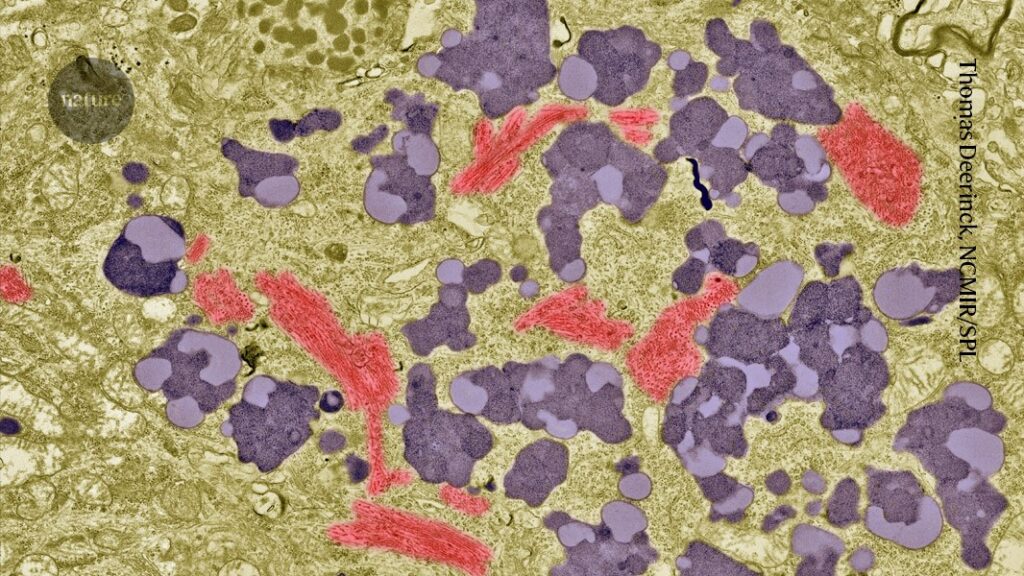A blood test measuring levels of tau protein is almost 98% accurate in ruling out Alzheimer’s disease in individuals with cognitive impairments.Credit: Thomas Deerinck, NCMIR/Science Photo Library
A new blood test to aid with the diagnosis of Alzheimer’s disease has been approved by the US Food and Drug Administration (FDA). The test, which is designed to rule out cognitive decline caused by Alzheimer’s disease, is the first blood test cleared for use in primary-care settings but not a first for Alzheimer’s.
Elecsys pTau181 — developed by two pharmaceutical companies, Roche in Basel, Switzerland and Eli Lilly in Indianapolis, Indiana — measures a specific phosphorylated form of tau, known as pTau181 in blood plasma. The test quantifies how much tau protein in the body has been modified as a result of Alzheimer’s disease.
In a press release on 13 October, Roche reported that in a clinical trial of 312 participants, the Elecsys pTau181 test was correctly able to rule out Alzheimer’s 97.9% of the time. The test uses a negative predictive value and helps to rule out Alzheimer’s in individuals with cognitive decline, rather than giving a positive indication that someone has the disease.

Faster, cheaper, better: the rise of blood tests for Alzheimer’s
“Numerous research studies have shown that these blood signatures have high concordance. They agree really well with the gold standard biomarkers of Alzheimer’s disease, which we have been using in specialized settings for many years”, says Ashvini Keshavan, a neurologist and biomarker researcher at University College London.
However, without full access to the trial data, Keshavan says it’s difficult to fully assess how accurate the test is. “It would be important to see the sensitivity, specificity and positive prediction values to assess the accuracy of this test.”
How accurate is the blood test?
Alzheimer’s disease pathology is characterized by the build-up of sticky amyloid-β plaques and tangles of tau proteins in brain tissue. Both proteins disrupt brain function, lead to neuron death and are the causes of cognitive decline associated with the disease1.
One other Alzheimer’s blood test has already been approved to measure these biomarkers in individuals’ blood. In May, Lumipulse, developed by biotechnology firm Fujirebio in Tokyo, gained approval from the FDA. This test measures the ratio of two proteins: pTau217 and amyloid-β (1–42). Alicia Algeciras-Schimnich, a clinical chemist at the Mayo Clinic in Rochester, Minnesota, says the two tests work slightly differently — with the Lumipulse test able to both positively test for and rule out the presence of Alzheimer’s pathology.
During a trial of 499 people, 97% of individuals who tested negative for the disease on the Lumipulse test had their results confirmed by follow-up diagnostics tests, which measure the levels of these proteins in the cerebrospinal fluid and brain tissue. Almost 92% of those with a positive Lumipulse result for Alzheimer’s disease had positive follow-up tests.

Coloured magnetic resonance imaging (MRI) scans of a healthy brain (left) and a brain with aggregations of tau proteins (right). Credit: Mark & Mary Stevens Neuroimaging and Informatics Inst./Science Photo Library
But as accurate as they’re said to be, the blood tests are prone to uncertain results when linking cognitive symptoms with Alzheimer’s. Individuals can fall into a ‘grey zone’ and require further testing to provide a clear diagnosis.
More than 30% of all samples that were analysed with a pTau217 test developed by Quanterix, a life-sciences company in Billerica, Massachusetts, fell into this grey zone2. A similar number has not been reported for the Elecsys or Lumipulse tests.

